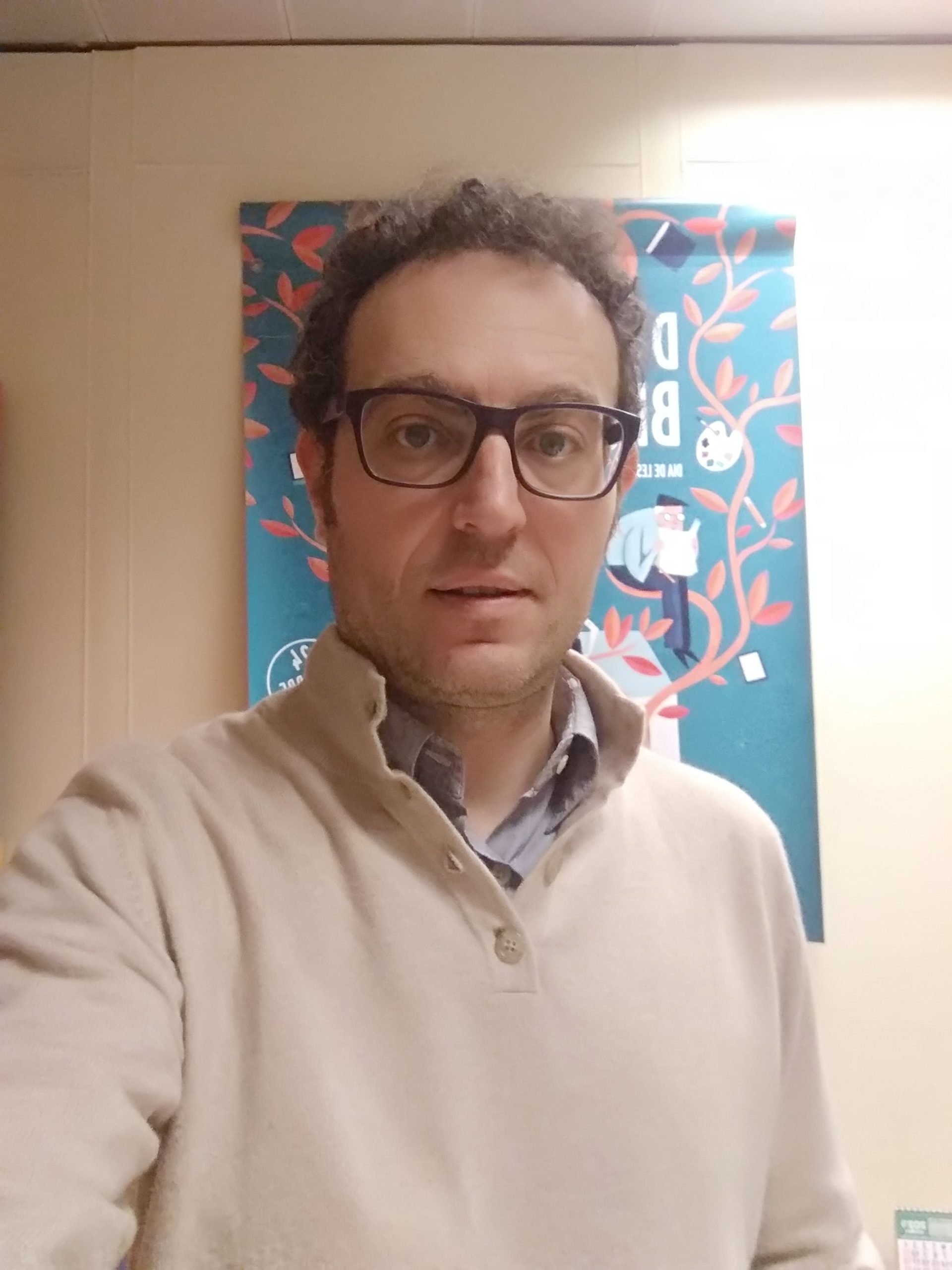The guest of the Library blog Geros knygos is the coordinator of NAPLE Sister Libraries programme Diego Gracia (Spain).
NAPLE Sister Libraries is a cooperation programme for public libraries situated in any of the participating NAPLE countries/region that wish to find a partner or sister library in another country. The coordinator of the programme is Spain (Subdirectorate General for Library Cooperation, Ministry of Culture and Sports).
Dear Diego, you are the coordinator of the NAPLE Sister Libraries project, where public libraries from all Europe share their best experience, represent their ideas of successful cooperation. What do you find most exciting in this programme? What are the benefits for the libraries to participate in this cooperation programme?

Libraries that participate in the program are part of a network of libraries in Europe that are interested in cooperation. It’s a platform for partner searching. They can also find Best Practice they can adapt to their library.
But for me, the most important benefit is that they can make an impact at the international level: the activities they share reach a big audience from all over the world. This visibility can open opportunities for them to show their work in Conferences, for example, or to receive offers to participate in Erasmus+ projects.
Public libraries are very focused on the local: they offer their services to their communities and often think that outside these communities, what they do is not relevant. But it is.
There surely were many interesting practices from European public libraries since the period of the COVID-19 pandemic has started. Librarians always are so creative. What were the most interesting activities from European libraries which were shared on NAPLE Sister Libraries website?
There‘s a lot of different activities. Most of them have to do with putting in contact the users of both libraries, for example the children. Sometimes they send postcards or presents to each other so they can know a little better the culture of their countries. Castropol (Spain) and Prelog (Croatia) started their cooperation with an exhibition of pictures from their towns: the children users of one library took pictures of their town and sent it to be exhibited in the other library. Another popular activity is the Interest Points with books explaining the culture of your sister librarie‘s country, or books from authors of their countries.
What book genres do you personally like?
I don‘t have any preferences regarding genres. I read mostly fiction, but I combine them with essays.
What is your favourite area in a library?
For me, the most precious characteristic of a library is that it‘s a place that enables interaction with others around book and reading. Libraries, no matter if they are public libraries, university libraries, or other type, should be in the center of the communities they serve. They should be the common place that everyone feels as their own. And I‘m very interested in the possibilities it offers as a place where people can work collaboratively, for example, introducing methodologies used by the citizen labs. So, I‘d say my favourite place of the library is probably the lobby
What three books would come to your mind first, if you were asked to name three favourite ones?
An all-time favourite of mine is the Irish Flann O‘Brien. He didn‘t write many books, but all of them are excellent. I‘d pick „The Third Policeman“, although its most iconic book is „At-Swim-Two-Birds“. I enjoyed a lot „Water Music“ from T.C. Boyle, a book of adventures. And was impressed by Robert Walser, by its sensitivity. I‘ll pick „The Assistant“, the first novel I read from him. Janet Lewis has been a recent discovery, but „The Ghost of Monsieur Scarron“ is now one of my favourites.
What are your favourite Spanish authors or the books of Spanish authors?
I like the classics but I‘ll recommend authors of today. Juan Gómez Bárcena has been my last discovery. He has a very personal style, rich and obscure. Javier Calvo is one of my favourites from the last years. And Laura Fernández, I liked specially her first novel, „Bienvenidos a Welcome“, a science fiction book.
Have any places described in the book ever inspired you to visit them?
Yes, I‘d love to go to the Ringstraße described by Joseph Roth and Arthur Schnitzler. But it also happens the contrary: somnetimes I read books that describe places I‘d try to avoid at all cost.
In what languages can you read?
I can read in English and Spanish.
Do you like poetry? Do you have favourite poet?
I don‘t read much poetry, but I liked a lot Frank O‘Hara.
Mothers of America
let your kids go to the movies!
(from F. O‘Hara‘s poem „Ave Vita“)
What is your favourite film adaptation of a novel?
It‘s very hard to pick just one. „The Night of the Hunter“, „ The Blade Runner“, „The Third Man“, „The Godfather“, „The Maltese Falcon“.
Would you rather be stuck on an island without a book OR be stuck in a room full of books you don’t like?
It‘s very cruel to make me choose between two terrible situations. I‘ll say a room full of books, but I‘d ask not knowing that I don‘t like any of them. This way, I can keep the hope in the next book.
When books, magazines, newspapers, reference materials, music, movies, and other traditional library content all go electronic and online – deliverable on demand – what does that mean for the future of the physical spaces known as “libraries?”
Libraries used to be the only place for a lot of people to access information and knowledge. But not anymore: today, the vast majority of the citizens in our societies carry wih them a device that gives them access to a huge amount of information through a simple search. This fact should make us rethink our libraries. In words of Morgens Vestergaard, the library used to be transactional (based on the lending of resources and the providing of information about the collections) and now it must shift to the relational: to be a living space whith the focus on social interaction.
So libraries as a physical space have a brilliant future in my opinion, if they understand this change. They are cultural institutions, open to all, diverse, with a great capilarity in our societies: they are in every neighbourhood in every city. Citizens feel the libraries as their own and value its importance even when they never set a foot inside one. They are ideal to become the agora of our communities.
„The only thing that you absolutely have to know, is the location of the library“ (Albert Einstein). Do you think this simple but ingenious idea is still relevant today?
No, not really, at least not in the sense in which Einstein enunciated it. I read a book by Ramon Salaberria called „self-taught people in libraries“. One of the examples was a couple that had learnt how to build a ship so they could travel around the world with it. And they had done so by consulting the books form their local library. It‘s a marvellous example, but I don‘t think this would happen today. You wouldn‘t think of the library, you‘ll go to Youtube probably.
The library must become useful again. I know a lot of people that don‘t use the library because they can afford to buy the books they read. This vision of the library as a wharehouse of books and a place where people can read the newspaper or browse the internet is very limited and sad, but lets‘s face it: a lot of libraries are like this. The library can be much more than that, and we have the responsibility to make this change.
Thank you for the interview!
Photo from Diego Gracia’s personal archive
Interviewed by Virginija Švedienė
virginija.svediene@pavb.lt

